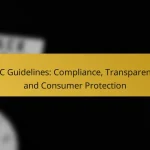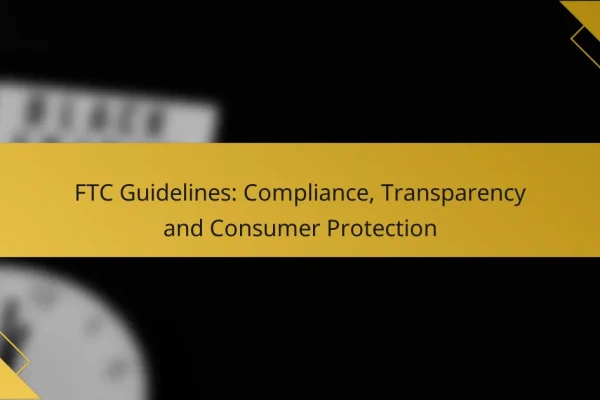What are the legal requirements for affiliate marketing in the United States?
In the United States, affiliate marketing is governed by various legal requirements that ensure transparency and fairness in advertising. Key regulations include compliance with Federal Trade Commission (FTC) guidelines, disclosure obligations for affiliates, and adherence to state-specific laws.
Federal Trade Commission (FTC) guidelines
The FTC provides clear guidelines for affiliate marketing to prevent deceptive practices. Affiliates must ensure that their promotions are truthful and not misleading, which includes providing accurate information about products and services.
Affiliates should be aware that failure to comply with FTC regulations can lead to significant penalties, including fines. Regularly reviewing the FTC’s resources can help affiliates stay informed about any updates or changes in the guidelines.
Disclosure requirements for affiliates
Affiliates are required to disclose their relationship with the brands they promote. This means clearly stating that they may earn a commission for sales generated through their links. Such disclosures should be prominent and easily visible to consumers.
Using phrases like “I may earn a commission” or “affiliate link” is recommended. Disclosures should be placed near the affiliate links or at the beginning of the content to ensure transparency and compliance with FTC rules.
State-specific regulations
In addition to federal guidelines, affiliates must also consider state-specific regulations that may apply to their marketing practices. Some states have unique laws regarding advertising and consumer protection that can impact affiliate marketing strategies.
For example, California has stringent privacy laws that require affiliates to inform consumers about data collection practices. Affiliates should research and understand the regulations in their respective states to avoid legal complications.
How can affiliates ensure ethical practices?
Affiliates can ensure ethical practices by prioritizing transparency, honesty, and respect for consumer privacy. These principles help build trust with audiences and maintain a positive reputation in the affiliate marketing landscape.
Transparency with audience
Transparency involves openly communicating the nature of affiliate relationships to your audience. Affiliates should disclose when they earn commissions from product recommendations, as this fosters trust and credibility.
For example, including a brief statement like “I may earn a commission from purchases made through links on this site” can clarify the relationship without overwhelming the reader. This practice is not only ethical but often required by regulations in many countries.
Honest representation of products
Affiliates must provide an honest representation of the products they promote. This means sharing accurate information, including both benefits and potential drawbacks, to help consumers make informed decisions.
For instance, if a product has mixed reviews, it is essential to mention both positive and negative feedback rather than only highlighting the positives. Misleading claims can lead to consumer distrust and potential legal issues.
Respecting consumer privacy
Respecting consumer privacy is crucial in affiliate marketing. Affiliates should ensure that any data collected from users is handled responsibly and in compliance with relevant privacy laws, such as the GDPR in Europe.
Affiliates should also be transparent about data usage, informing users how their information will be used and obtaining consent where necessary. Avoiding excessive data collection and ensuring secure storage can further enhance consumer trust.
What are common legal pitfalls in affiliate marketing?
Common legal pitfalls in affiliate marketing include misleading advertising claims, failure to disclose affiliate relationships, and intellectual property violations. Understanding these issues is crucial for maintaining compliance and protecting your brand’s reputation.
Misleading advertising claims
Misleading advertising claims can lead to legal repercussions and damage your credibility. Affiliates must ensure that any claims about products or services are truthful and can be substantiated. For example, stating that a product can cure a disease without scientific evidence can result in legal action.
To avoid pitfalls, always verify the accuracy of the claims you make. Use clear, factual language and avoid exaggerations that could mislead consumers. Regularly review your marketing materials to ensure compliance with advertising standards.
Failure to disclose affiliate relationships
Failing to disclose affiliate relationships is a significant legal issue in affiliate marketing. The Federal Trade Commission (FTC) requires that affiliates clearly inform consumers when they have a financial interest in the products they promote. This transparency builds trust and complies with legal standards.
To ensure compliance, include clear disclosures in your content, such as “I may earn a commission if you purchase through my link.” Position these disclosures prominently, making them easily noticeable to your audience. Regularly educate yourself on the latest regulations to stay compliant.
Intellectual property violations
Intellectual property violations can occur when affiliates use copyrighted materials without permission. This includes using images, logos, or text from other brands without authorization, which can lead to legal disputes and financial penalties. Always seek permission or use licensed materials to avoid these issues.
To protect yourself, familiarize yourself with copyright laws and the specific terms of use for any content you wish to promote. Consider creating original content or using royalty-free resources. Regular audits of your marketing materials can help identify potential infringements before they become a problem.
How do international laws affect affiliate marketing?
International laws significantly impact affiliate marketing by establishing guidelines that marketers must follow to avoid legal issues. These regulations vary by country and can affect data privacy, advertising practices, and consumer protection.
GDPR compliance for European audiences
The General Data Protection Regulation (GDPR) requires affiliate marketers targeting European audiences to prioritize user consent and data protection. Marketers must obtain explicit consent before collecting personal data and provide clear information on how this data will be used.
To comply with GDPR, affiliates should implement transparent privacy policies, use opt-in forms, and ensure that any data processing is documented. Failure to comply can result in hefty fines, often reaching up to 4% of annual global turnover.
Cross-border advertising regulations
Cross-border advertising regulations dictate how marketing can be conducted across different countries, often requiring compliance with both local and international laws. Marketers must be aware of the specific advertising standards and consumer protection laws in each country they target.
For example, some countries have strict rules regarding misleading advertisements or specific claims about products. Affiliates should research local regulations and consider consulting legal experts to ensure compliance and avoid penalties.
What ethical considerations should affiliates prioritize?
Affiliates should prioritize transparency, honesty, and consumer trust in their marketing practices. This involves clearly disclosing relationships with brands and ensuring that promotions are truthful and not misleading.
Maintaining trust with consumers
Trust is essential in affiliate marketing, as it directly impacts consumer decisions. Affiliates can maintain trust by being transparent about their affiliations and providing honest reviews of products. This includes disclosing any financial incentives received for promoting a product.
Regularly engaging with your audience and addressing their concerns can further enhance trust. For instance, responding to comments and questions about products shows that you value consumer input and are committed to their satisfaction.
Promoting products responsibly
Responsible promotion involves selecting products that align with your audience’s values and needs. Affiliates should avoid promoting items that could harm consumers or are of questionable quality. Researching products and understanding their implications is crucial.
Additionally, affiliates should be cautious about making exaggerated claims. Using clear, factual language and providing evidence for any benefits can help avoid misleading consumers. A good practice is to only promote products you have personally vetted or used.
What frameworks exist for evaluating affiliate marketing practices?
Several frameworks help assess affiliate marketing practices, focusing on ethical standards, compliance, and effectiveness. These frameworks guide marketers in ensuring their strategies align with legal requirements and ethical norms while maximizing partnership benefits.
Ethical marketing frameworks
Ethical marketing frameworks provide guidelines for promoting products and services responsibly. They emphasize transparency, honesty, and respect for consumer rights. For instance, the American Marketing Association’s Code of Ethics encourages marketers to avoid misleading claims and to disclose affiliate relationships clearly.
Another example is the Federal Trade Commission (FTC) guidelines in the United States, which require affiliates to disclose their financial connections to the products they promote. This transparency helps build trust with consumers and fosters a more ethical marketing environment.
Best practices for affiliate partnerships
Best practices for affiliate partnerships include selecting affiliates that align with your brand values and target audience. Conduct thorough due diligence to ensure potential partners maintain a good reputation and adhere to ethical marketing standards. This alignment can enhance credibility and drive better results.
Additionally, regularly reviewing affiliate performance and compliance with guidelines is crucial. Establish clear communication channels and provide affiliates with the necessary resources to promote your products effectively. Avoid common pitfalls, such as neglecting to monitor affiliate activities or failing to update them on new products and promotions.











